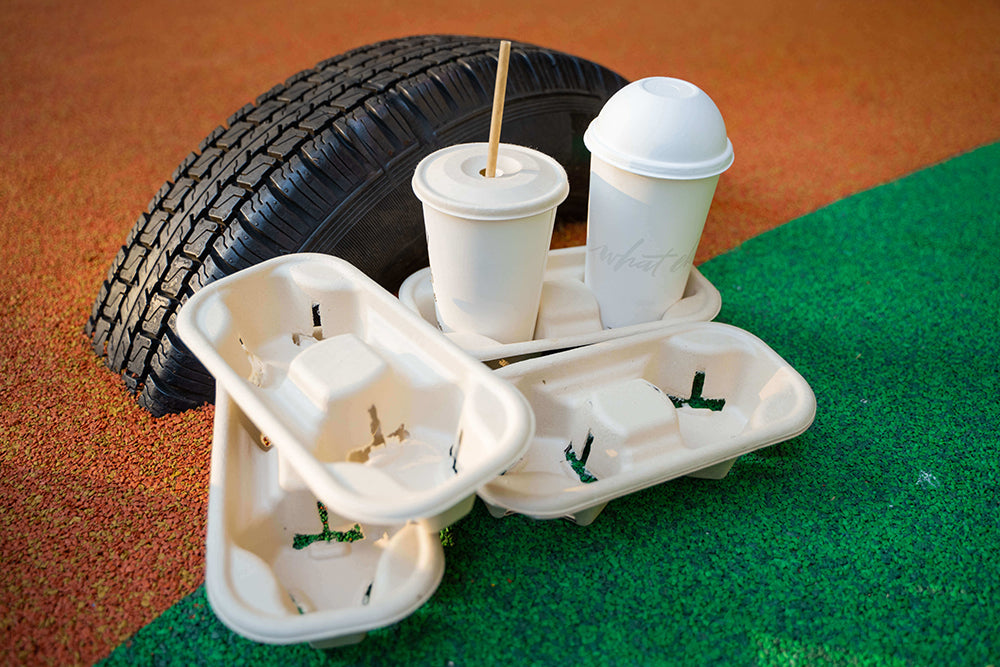Compostable products have become one of the most sought-after products in the past few years, especially as the plastic crisis worsens and plastic bans gain increasing popularity worldwide.
It’s not hard to find compostable products in a café or restaurant in your area, from straws to utensils and takeaway lunch boxes. These items may seem small and insignificant, but they play a major role in polluting our environment, especially harming marine life.
In this article, we will delve deeper into the definition of compostable products, their advantages and disadvantages, and how to effectively apply them to your business to meet your sustainability goals with ease.
What Are Compostable Products?
Compostable products are items made from organic materials that can decompose naturally, returning to the soil without leaving behind harmful residues or toxins. Unlike traditional plastics, which can take hundreds of years to degrade, compostable products break down into organic matter within a relatively short period, contributing to the circular economy.
Compostable products can be broadly categorized into two types: those suitable for industrial composting facilities and those conducive to natural or home composting environments.

Industrial Composting Products
These products are designed to be processed in large-scale composting facilities, where controlled conditions facilitate rapid decomposition. Industrial composting offers a convenient solution for managing organic waste on a mass scale, diverting it from landfills and incinerators. Items made from bio-plastic (PLA, PVA) products like straws, food packaging, utensils, and biodegradable bags fall under this category.

PLA products all need to be handled in industrial composting facilities
Pros and Cons of Industrial Composting
Pros of industrial composting:
- Efficient decomposition: Industrial composting accelerates the breakdown process, reducing waste accumulation.
- Suitable for urban environments: Ideal for areas lacking space or infrastructure for home composting.
- Suitable for large-scale requirements: Facilities often collect large amounts of bioplastic products to compost at once. It’s efficient for handling massive amounts.
Cons of industrial composting:
- Limited accessibility: Industrial composting facilities are not widely available, limiting the disposal options for consumers.
- Transportation emissions: Transporting waste to distant composting facilities can negate environmental benefits.
- Contamination risk: Non-compostable items mixed with compostable waste can compromise the quality of compost.
In an ideal world, if all biodegradable or industrial compostable products could be collected and handled at composting facilities, environmental concerns would be significantly reduced. However, in reality, the number of composting facilities is very limited globally, and the facilities that can actually handle bioplastic products account for only 0.5% in the U.S. This, unfortunately, means that most industrial composting or bioplastic products are left unhandled in landfills. They will have the same characteristics just like traditional plastics, taking hundreds of years to decompose and releasing toxic chemicals into the environment, affecting the habitats of several species.
Home Composting Products
Home composting mimics the organic decomposition process found in nature, utilizing backyard compost bins or compost heaps to break down organic matter. This approach empowers individuals to take control of their organic waste, converting kitchen scraps, yard trimmings, and compostable products like EQUO's straws, utensils, and food containers into nutrient-rich compost for soil enrichment.
Pros and Cons of Home Composting
Pros:
- Cost-effective and accessible: Requires minimal investment in equipment and can be implemented in any household with outdoor space.
- Promotes soil health: Homemade compost enriches soil fertility, reduces the need for chemical fertilizers, and fosters a healthy garden ecosystem.
- Educational value: A good starting point for sustainable practices, fostering environmental awareness and responsibility.
Cons:
- Time-consuming: Natural composting requires patience, as decomposition can take several months to a year, depending on environmental factors.
- Space limitations: Not feasible for individuals living in apartments or urban settings with limited outdoor space.
- Pest attraction: Improperly managed compost bins may attract pests such as rodents or insects, posing hygiene concerns.
>> Check out this article to learn more about how to do home composting effortlessly.
Choosing the Sustainable Path:
As we weigh the long-term benefits for both humanity and the environment, the spotlight shines brightly on home composting products. While industrial composting offers convenience and scalability, home composting empowers individuals to take direct action in sustainable waste management. By embracing natural composting methods, we not only enrich our soil and reduce reliance on harmful chemicals but also foster a deeper connection to our environment. It's a small step for each of us but a giant leap toward a greener, more sustainable future.


